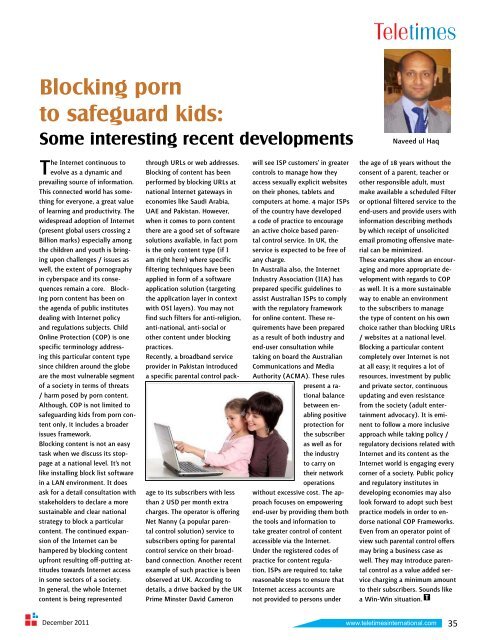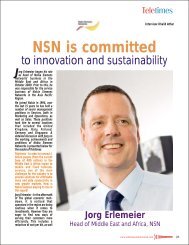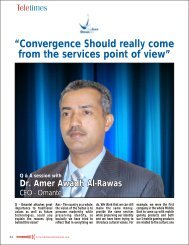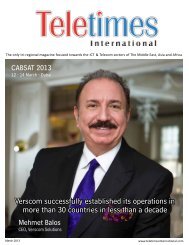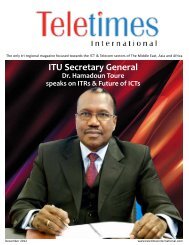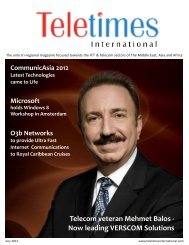You also want an ePaper? Increase the reach of your titles
YUMPU automatically turns print PDFs into web optimized ePapers that Google loves.
Blocking pornto safeguard kids:Some interesting recent developmentsThe Internet continuous toevolve as a dynamic andprevailing source of information.This connected world has somethingfor everyone, a great valueof learning and productivity. Thewidespread adoption of Internet(present global users crossing 2Billion marks) especially amongthe children and youth is bringingupon challenges / issues aswell, the extent of pornographyin cyberspace and its consequencesremain a core. Blockingporn content has been onthe agenda of public institutesdealing with Internet policyand regulations subjects. ChildOnline Protection (COP) is onespecific terminology addressingthis particular content typesince children around the globeare the most vulnerable segmentof a society in terms of threats/ harm posed by porn content.Although, COP is not limited tosafeguarding kids from porn contentonly, it includes a broaderissues framework.Blocking content is not an easytask when we discuss its stoppageat a national level. It’s notlike installing block list softwarein a LAN environment. It doesask for a detail consultation withstakeholders to declare a moresustainable and clear nationalstrategy to block a particularcontent. The continued expansionof the Internet can behampered by blocking contentupfront resulting off-putting attitudestowards Internet accessin some sectors of a society.In general, the whole Internetcontent is being representedthrough URLs or web addresses.Blocking of content has beenperformed by blocking URLs atnational Internet gateways ineconomies like Saudi Arabia,UAE and Pakistan. However,when it comes to porn contentthere are a good set of softwaresolutions available, in fact pornis the only content type (if Iam right here) where specificfiltering techniques have beenapplied in form of a softwareapplication solution (targetingthe application layer in contextwith OSI layers). You may notfind such filters for anti-religion,anti-national, anti-social orother content under blockingpractices.Recently, a broadband serviceprovider in Pakistan introduceda specific parental control packageto its subscribers with lessthan 2 USD per month extracharges. The operator is offeringNet Nanny (a popular parentalcontrol solution) service tosubscribers opting for parentalcontrol service on their broadbandconnection. Another recentexample of such practice is beenobserved at UK. According todetails, a drive backed by the UKPrime Minster David Cameronwill see ISP customers’ in greatercontrols to manage how theyaccess sexually explicit websiteson their phones, tablets andcomputers at home. 4 major ISPsof the country have developeda code of practice to encouragean active choice based parentalcontrol service. In UK, theservice is expected to be free ofany charge.In Australia also, the InternetIndustry Association (IIA) hasprepared specific guidelines toassist Australian ISPs to complywith the regulatory frameworkfor online content. These requirementshave been preparedas a result of both industry andend-user consultation whiletaking on board the AustralianCommunications and MediaAuthority (ACMA). These rulespresent a rationalbalancebetween enablingpositiveprotection forthe subscriberas well as forthe industryto carry ontheir networkoperationswithout excessive cost. The approachfocuses on empoweringend-user by providing them boththe tools and information totake greater control of contentaccessible via the Internet.Under the registered codes ofpractice for content regulation,ISPs are required to; takereasonable steps to ensure thatInternet access accounts arenot provided to persons underNaveed ul Haqthe age of 18 years without theconsent of a parent, teacher orother responsible adult, mustmake available a scheduled Filteror optional filtered service to theend-users and provide users withinformation describing methodsby which receipt of unsolicitedemail promoting offensive materialcan be minimized.These examples show an encouragingand more appropriate developmentwith regards to COPas well. It is a more sustainableway to enable an environmentto the subscribers to managethe type of content on his ownchoice rather than blocking URLs/ websites at a national level.Blocking a particular contentcompletely over Internet is notat all easy; it requires a lot ofresources, investment by publicand private sector, continuousupdating and even resistancefrom the society (adult entertainmentadvocacy). It is eminentto follow a more inclusiveapproach while taking policy /regulatory decisions related withInternet and its content as theInternet world is engaging everycorner of a society. Public policyand regulatory institutes indeveloping economies may alsolook forward to adopt such bestpractice models in order to endorsenational COP Frameworks.Even from an operator point ofview such parental control offersmay bring a business case aswell. They may introduce parentalcontrol as a value added servicecharging a minimum amountto their subscribers. Sounds likea Win-Win situation.December 2011www.teletimesinternational.com35


